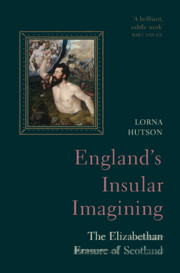Book contents
- England’s Insular Imagining
- England’s Insular Imagining
- Copyright page
- Contents
- Plates
- Abbreviations
- Acknowledgements
- Introduction
- Chapter 1 Writing the Forgotten War I: Henry’s War, 1542–1547
- Chapter 2 Writing the Forgotten War II: Somerset’s War, 1547–1550
- Chapter 3 How England Became an Island: The Faerie Queene
- Chapter 4 Scotland sui juris? Scottish Literature and the Marian Constitutional Crisis, 1567–1573
- Chapter 5 On the Knees of the Body Politic: Scottish Succession and English Liberties, 1567–1608
- Chapter 6 Scotland Un-kingdomed: English History on Stage
- Chapter 7 Race-Making in the Invention of Britain: The Masque of Blackness
- Chapter 8 Divisions and Kingdoms: Oedipal Britain from Gorboduc to King Lear
- Coda: Macbeth. ‘Alas, poor country’
- Works Cited
- Index
- Plate Section (PDF Only)
Chapter 5 - On the Knees of the Body Politic: Scottish Succession and English Liberties, 1567–1608
Published online by Cambridge University Press: 28 September 2023
- England’s Insular Imagining
- England’s Insular Imagining
- Copyright page
- Contents
- Plates
- Abbreviations
- Acknowledgements
- Introduction
- Chapter 1 Writing the Forgotten War I: Henry’s War, 1542–1547
- Chapter 2 Writing the Forgotten War II: Somerset’s War, 1547–1550
- Chapter 3 How England Became an Island: The Faerie Queene
- Chapter 4 Scotland sui juris? Scottish Literature and the Marian Constitutional Crisis, 1567–1573
- Chapter 5 On the Knees of the Body Politic: Scottish Succession and English Liberties, 1567–1608
- Chapter 6 Scotland Un-kingdomed: English History on Stage
- Chapter 7 Race-Making in the Invention of Britain: The Masque of Blackness
- Chapter 8 Divisions and Kingdoms: Oedipal Britain from Gorboduc to King Lear
- Coda: Macbeth. ‘Alas, poor country’
- Works Cited
- Index
- Plate Section (PDF Only)
Summary
Chapter 5 challenges accounts of the ‘Union’ debate of 1603–1608 as a story of English constitutionalist resistance to James’s absolutist Union. Edmund Plowden’s Treatise (1567) used the ‘King’s Two Bodies’ to locate sovereignty in the ‘body politic’ of the English common law. He transformed the old Galfridian notion of English overlordship into an allegory of Scotland’s jurisdictional sub-nationality, Scotland’s body politic kneeling before England’s. The problem created by James’s accession was how, after Plowden, to deny Scots the rights of English naturalisation. How to justify excluding Scots from free trade with England and from the common law liberties of Englishmen? Sir Henry Savile and Sir Henry Spelman drew ingeniously on myths of King Edgar’s (943–975) thalassocratic rule over the British islands to argue simultaneously that Scots were aliens and (lest that suggest that a Scottish accession had brought England geopolitical advantages to be recompensed) that this alien nation’s coastlines had nevertheless always been under English sea-sovereignty. England’s trade expanded while Scots, though subject to English foreign policy, were excluded as aliens from participation.
- Type
- Chapter
- Information
- England's Insular ImaginingThe Elizabethan Erasure of Scotland, pp. 154 - 187Publisher: Cambridge University PressPrint publication year: 2023



